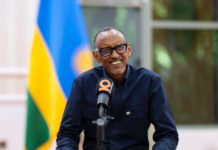(Reuters) – Democratic Republic of Congo President Joseph Kabila said on Saturday he was planning an initiative aimed at uniting the central African nation, torn by an eastern rebellion and a furious political opposition.
“National cohesion must not be conditional, it must be open for all,” Kabila said in an address to parliament. “An initiative will be taken shortly, the details to be decided in due course. There should not be a Congo for the majority and a separate one for the opposition.”
It was a rare public address by Kabila, who has been increasingly in the shadows since he was reelected in 2011 polls widely seen as fraudulent and since mutinous soldiers launched the M23 rebellion in resource-rich eastern Congo in April.
He gave no details of the initiative, though M23 rebels have repeatedly demanded that Kabila open negotiations to address opposition grievances, along with their own. Congo’s opposition has accused Kabila of stealing the 2011 election and of using security forces to stifle dissent.
Rebel and government representatives are in peace talks in neighbouring Uganda which began after the rebels withdrew from Goma, the provincial capital of North Kivu in eastern Congo, which they had seized from U.N.-backed Congolese soldiers in November.
Kabila said those talks were aimed at “clarifying the stakes and establishing the responsibilities”, but gave no further details. United Nations experts and the government in Kinshasa believe the rebellion is backed by neighbouring Rwanda and Uganda, claims those countries vehemently deny.
Kabila said Congo’s government was renewing a call for a strengthening of the U.N. peacekeeping mission’s mandate in Congo, and was also seeking to reinforce its own army – which is notoriously undisciplined.
The United Nations launched a review of the world’s biggest and most expensive U.N. peacekeeping mission – known as MONUSCO – after it let M23 rebels seize the city of Goma in November when Congo’s army retreated.
“The limits of the approach of MONUSCO were a disappointment to the government and to the people,” Kabila said. “We have asked for a strengthening of its mandate. We will also accelerate the pace of improving the capacity of the army.”
By Bienvenu Bakumanya
(Writing by Richard Valdmanis; Reporting by Bienvenu Bakumanya; editing by Jason Webb)






























































